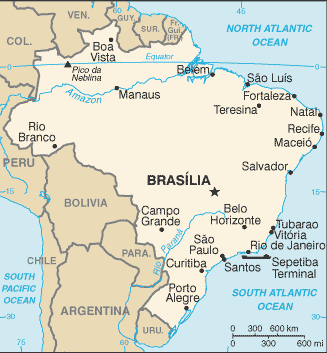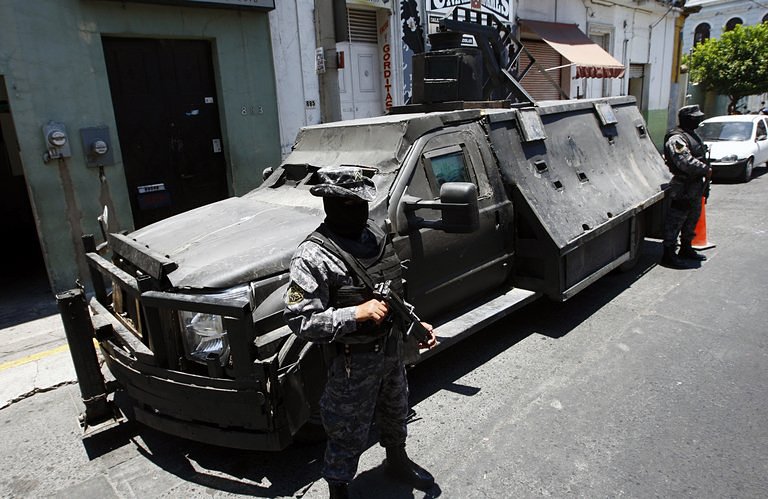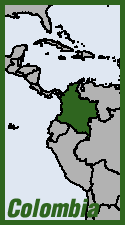 Gunmen killed at least 18 people in outlying districts of Brazil's largest city, Sao Paulo, in a series of overnight attacks Aug. 14. Witnesses and video footage in several locations indicated that masked gunmen pulled up in a car before opening fire. In many cases they checked the victims' names before shooting, or asked if they had criminal records. At least six other people were injured in the attacks, in the districts of Osasco and Barueri. Authorities are said to be investigating whether the attacks were a coordinated campaign of revenge by off-duty officers following the deaths of two colleagues in the targeted districts the previous week. Police in Brazil are responsible for more than 2,000 deaths per year, and rights groups say off-duty officers rarely face prosecution when they in engage in vigilante justice. (Reuters, BBC News, Aug. 15)
Gunmen killed at least 18 people in outlying districts of Brazil's largest city, Sao Paulo, in a series of overnight attacks Aug. 14. Witnesses and video footage in several locations indicated that masked gunmen pulled up in a car before opening fire. In many cases they checked the victims' names before shooting, or asked if they had criminal records. At least six other people were injured in the attacks, in the districts of Osasco and Barueri. Authorities are said to be investigating whether the attacks were a coordinated campaign of revenge by off-duty officers following the deaths of two colleagues in the targeted districts the previous week. Police in Brazil are responsible for more than 2,000 deaths per year, and rights groups say off-duty officers rarely face prosecution when they in engage in vigilante justice. (Reuters, BBC News, Aug. 15)

 Yet more grim evidence emerged this week that Mexico's warring cartels are becoming a real military force and underground parallel state in the country's lawless northeast.
Yet more grim evidence emerged this week that Mexico's warring cartels are becoming a real military force and underground parallel state in the country's lawless northeast.  Indonesia executed six convicted on drug charges Jan. 17, rejecting last-minute appeals for clemency from international leaders. Four men from Brazil (possession of 13 kilos of cocaine), Malawi (1 kilo of heroin), Nigeria (1 kilo heroin) and the Netherlands (ecstacy production) and one Indonesian woman (3 kilos heroin) were put to death by firing squad on Nusakambangan Island, off the southern coast of Java. Another woman from Vietnam (1 kilo of methamphetamine) was executed in Boyolali, in central Java. Brazilian President
Indonesia executed six convicted on drug charges Jan. 17, rejecting last-minute appeals for clemency from international leaders. Four men from Brazil (possession of 13 kilos of cocaine), Malawi (1 kilo of heroin), Nigeria (1 kilo heroin) and the Netherlands (ecstacy production) and one Indonesian woman (3 kilos heroin) were put to death by firing squad on Nusakambangan Island, off the southern coast of Java. Another woman from Vietnam (1 kilo of methamphetamine) was executed in Boyolali, in central Java. Brazilian President  2014 witnessed considerable fraying of the international Drug War consensus—but the horrific violence that finally sparked this long-overdue reckoning continued to take its grim toll. On the upside, Uruguay regsitered its
2014 witnessed considerable fraying of the international Drug War consensus—but the horrific violence that finally sparked this long-overdue reckoning continued to take its grim toll. On the upside, Uruguay regsitered its  Colombia's President Juan Manuel Santos on Oct. 22 announced the capture of one of the country's top fugitive crime lords—Marcos de Jesús Figueroa AKA "Marquitos"—in the Brazilian jungle city of Boa Vista. The extraordinary operation was coordinated by police forces in both Colombia and Brazil. "Marquitos" was considered the reigning boss of the lucrative narco trade in Colombia's northern region of La Guajira, with access to both the Caribbean Sea and the porous Venezuelan border. He is held responsible for a long reign of terror by criminal gangs and their paramilitary allies in the region—personally culpable in at least 100 deaths, according to authorities. Santos took the apprehension of Marquitos as an opportunity to crow: "With this, we say to criminals that it makes no difference where you are, we are going to catch you." (
Colombia's President Juan Manuel Santos on Oct. 22 announced the capture of one of the country's top fugitive crime lords—Marcos de Jesús Figueroa AKA "Marquitos"—in the Brazilian jungle city of Boa Vista. The extraordinary operation was coordinated by police forces in both Colombia and Brazil. "Marquitos" was considered the reigning boss of the lucrative narco trade in Colombia's northern region of La Guajira, with access to both the Caribbean Sea and the porous Venezuelan border. He is held responsible for a long reign of terror by criminal gangs and their paramilitary allies in the region—personally culpable in at least 100 deaths, according to authorities. Santos took the apprehension of Marquitos as an opportunity to crow: "With this, we say to criminals that it makes no difference where you are, we are going to catch you." (





Recent comments
3 weeks 3 days ago
3 weeks 3 days ago
6 weeks 4 days ago
7 weeks 3 days ago
11 weeks 4 days ago
15 weeks 2 days ago
19 weeks 2 days ago
20 weeks 1 day ago
30 weeks 1 day ago
34 weeks 1 day ago